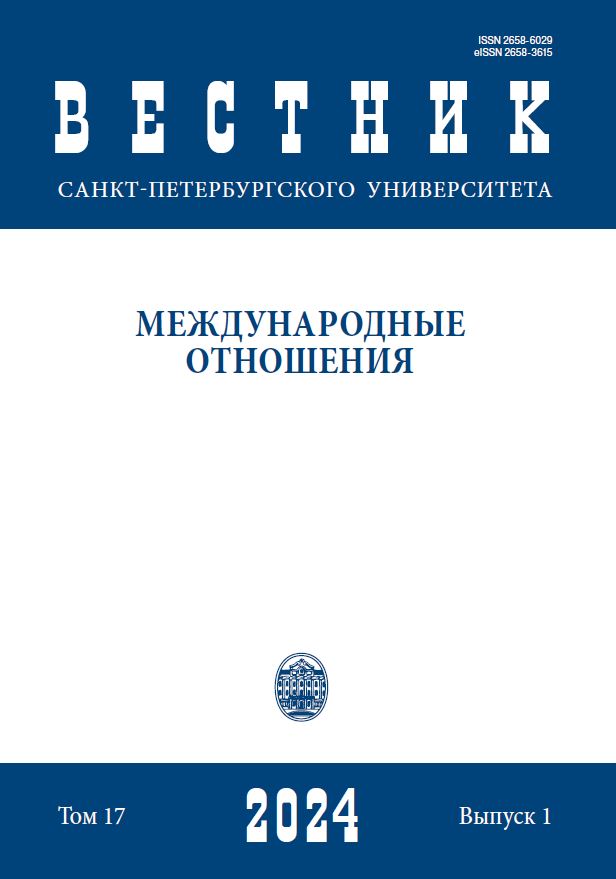Global Citizenship Initiative: UNESCO education policies through the prism of identity studies
DOI:
https://doi.org/10.21638/spbu06.2024.106Аннотация
For many decades since the establishment of UNESCO, the organization has promoted and defended the idea of Global education. One of the reasons was the necessity to improve live standards, but also to create the global thinking and mutual understanding in order to avoid further conflicts and wars. The article examines the evolution of UNESCO Global citizenship initiative as an attempt to construct Global identity. Global identity falls under the identity studies object, as it is both a process and a state under construction with the aim at unifying peoples around the world. For the first three decades of UNESCO policies, it attempted to construct a positive identity, uniting people through shared values. The attempt lacked negative element and material elements to it. As a result, since 1970s, a new idea emerged that became the backbone of further UNESCO and UN policies – the idea of environmental threats opposing the humanity. These gradually evolved by 2000s into Sustainable Development Goals and Global Citizenship initiative. In recent years, UNESCO highlights new challenges – COVID Pandemics and spread of international conflicts, and the organization shifts its policy again in order to create unifying ground for peoples around the world amid these new challenges.
Ключевые слова:
UNESCO, education policies, global citizenship, global identity, Education for All, Sustainable Development
Скачивания
Библиографические ссылки
Constitution of the United Nations Educational, Scientific and Cultural orgnaisation (UNESCO) (1945), Foreign and Commonwealth office, General no. 279B. London, UK, November 16. Available at: https://atom.archives.unesco.org/constitution (accessed: 04.04.2023).
Bolborici, A.-M. (2016), The Immigration Crisis — Reflections Concerning the Crisis of European Identity, Bulletin of the Transilvania University of Braşov, Series VII: Social Sciences and Law, vol. 9, no. 1, pp. 39–46.
Jeremiah, E. (2013), The Development, Logic, and Legacy of Reflexive Concepts in Greek Philosophy, Journal of History of Ideas, vol. 74, no. 4, pp. 507–529.
Triandafyllidou, A., Marchetti, S. and Molho, J. (2020), Cultures and Identities course, European university institute, Future Learn. Available at: https://www.futurelearn.com/courses/culture-identity-europe (accessed: 27.10.2020).
Bikerniece, A. (2018), The Evolution of European Political Identity as a Social Construct of the EU, Society: Politics, Economics, Law, no. 5 (58), pp. 23–29. https://doi.org/10.24158/pep.2018.5.4
Resolution adopted by the General Assembly on 25 September 2015. 70/1. Transforming our world: the 2030 Agenda for Sustainable Development. General Assembly, UN, A/RES/70/1, 21.10.2015. Available at: https://www.un.org/en/development/desa/population/migration/generalassembly/docs/globalcompact/A_RES_70_1_E.pdf (accessed: 04.04.2023).
Hughes, C. (2022), Global Citizenship: Lessons from the Ancients, UNESCO International Bureau of Education.
Global Citizenship education. Glossary, UNESCO. Available at: http://uis.unesco.org/en/glossary-term/global-citizenship-education (accessed: 03.04.2023)
Accountability in education: Meeting Our Commitments. Global Education Monitoring Report (2017), Paris: UNESCO Publishing.
Reimagining our Futures Together. A New Social Contract for Education (2021), Paris: UNESCO.
M’Bow, A.-M. (1981), Building the Future. Unesco and the solidarity of Nations, Paris: United Nations Educational, Scientific and Cultural Organization.
Education for All 2000-2015: achievements and challenges (2015), Paris: UNESCO Publishing.
Fundamental education: definition and programme. 2 C/97; FE. Conf./6. Mexico City, Mexico, 1947. Available at: https://digital.archives.unesco.org/en/collection/governing-documents/detail/7e92dcf8-962f-11e8-8718-d89d6717b464/media/9d75b1f2-4129-15c9-60e3-bb1e88da3fa2?mode=detail&view=horizonta l&q=education&rows=1&page=2 (accessed: 03.04.2023).
Records of the general Conference of the United Nations Educational, Scientific and Cultural organization. Fourth Session. 4C/Proceedings. 5 C/2. Annex (1949), Paris.
Discussion on a General Subject. Memorandum Presented by M. Giuseppe Vedovato, Professor at the University of Florence. General Conference, Fourth Session, 4 C/2, United Nations Educational, Scientific and Cultural organization (1949), Italy, September 17.
UNESCO 1945–1995: A fact sheet. ARC. 95/WS/1. 1995. Available at: https://unesdoc.unesco.org/ark:/48223/pf0000101118 (accessed: 05.04.2023).
Elfert, M. and Draxler, A. (2022), The Faure report: 50 years on — Editorial introduction, UNESCO Institute for Lifelong Learning and Springer Nature B. V.
Faure E., Herrera, F., Kaddoura, A. R., Lopes, H., Petrovski, A. V., Rahnema, M. and Ward, F. Ch. (1972), Learning to Be. The World of Education Today and Tomorrow, Paris: UNESCO.
Education for people and planet: Creating Sustainable Futures for All. Global Education Monitoring Report (2016), Paris: UNESCO Publishing.
Recommendation concerning Education for International Understanding, Co-operation and Peace and Education relating to Human Rights and Fundamental Freedoms (1974), United Nations. Available at: https://www.ohchr.org/en/resources/educators/human-rights-education-training/3-recommendation-concerning-education-international-understanding-co-operation-and-peace-and (accessed: 16.04.2023).
World Declaration on Education for All. Meeting Basic Learning Needs. Jomtien, Thailand, March 3–5, 1990. Available at: https://unesdoc.unesco.org/ark:/48223/pf0000127583 (accessed: 05.04.2023).
Delors J. (1996), Learning: The Treasure Within, UNESCO Publishing.
Elfert, M. (2015), Learning to Live Together: Revisiting the Humanism of the Delors Report, UNESCO.
The Dakar Framework for Action. Education for All: Meeting our Collective Commitments (2000), Paris.
Incheon Declaration. Education 2030. World Education Forum 2015 (2015), Incheon.
International Commission. UNESCO. [03.04.2023]. Available at: https://en.unesco.org/futuresofeducation/international-commission (accessed: 03.04.2023).
Shaping the Future we Want. UN Decade of Education for Sustainable Development (2005–2014). Final Report (2014), Paris: United Nations Educational, Scientific and Cultural Organization.
Migration, displacement and education: Building Bridges, not Walls. Global Education Monitoring Report (2019), Paris: UNESCO Publishing.
Non-state actors in education: Who Chooses? Who Loses? Global Education Monitoring Report (2021), Paris: UNESCO.
Education 2030. Incheon Declaration and Framework for Action for the implementation of Sustain- able Development Goal 4 (2015), Paris: UNESCO.
Загрузки
Опубликован
Как цитировать
Выпуск
Раздел
Лицензия
Статьи журнала «Вестник Санкт-Петербургского университета. Международные отношения» находятся в открытом доступе и распространяются в соответствии с условиями Лицензионного Договора с Санкт-Петербургским государственным университетом, который бесплатно предоставляет авторам неограниченное распространение и самостоятельное архивирование.




